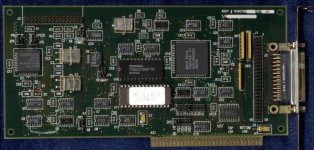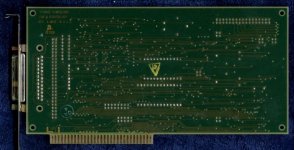deathshadow
Veteran Member
- Joined
- Jan 4, 2011
- Messages
- 1,378
I've been putting my old AT system back together after decades of the motherboard sitting in a box... I've got a fairly nice setup of stuff for it in terms of a G2 Ega, Aria 16 sound card and RampAT card -- that last one I'm still struggling with on parity errors that I don't think is the ram's fault 
But for the life of me I couldn't get IDE working with it. Back in the day it had a pair of 42 meg RLL drives in it, and the mobo BIOS's type 47 doesn't seem entirely compatible with any of my IDE controllers, or it just hates the fact the smallest IDE I have right now is 200 megs...
So I said 'to blazes with this' and tossed in one of the many SCSI controllers I happen to have lying around... and, well...
Is it just me, or was the AHA-1542CF the BEST disk controller ever made for the AT Bus? SCSI, MFM, RLL, IDE -- doesn't matter which -- Was there ever anything better than it?
For those of you not familiar with it:
http://www.deathshadow.com/images/AHA-1542CF.jpg
Adaptec EZ-BIOS that pimp-slaps even the crappiest AT BIOS into shape, floppy controller (that always seemed 'faster' somehow), software level turning on/off termination on the card, Configurable to a half dozen different ports, ability to co-exist with other cards of the same type, that nice big robust 50 pin Centronics D on the back instead of the rinky little crap that came later... The ENTIRE 154x series were absolutely great cards, but the 1542CF was like the pinnacle of the art of making a disk controller.
I mean, I'm sitting here with a 10mhz 286 that's got a 4 gig 10K RPM Seagate Cheetah... So I'm pushing 2.8megs/sec according to Norton's Sysinfo, even with the warning about the disk controller blocking the seek time test.
I'm half tempted to drag out my 50 to 68 pin converter to see how one of my 9 gig 15K RPM cheetah's works out for it... as it is I know one of those is going in my AM386/40 build since I've got two more 1542CF sitting here with nothing better to do.
Makes me wonder though, were there ever any good 8 bit SCSI controllers for PC? I've seen lots of them that were 'dumb' with no boot ROM or anything -- was there an equivalent? Be a hell of a lot less hassle than the whole XT-IDE thing.
But for the life of me I couldn't get IDE working with it. Back in the day it had a pair of 42 meg RLL drives in it, and the mobo BIOS's type 47 doesn't seem entirely compatible with any of my IDE controllers, or it just hates the fact the smallest IDE I have right now is 200 megs...
So I said 'to blazes with this' and tossed in one of the many SCSI controllers I happen to have lying around... and, well...
Is it just me, or was the AHA-1542CF the BEST disk controller ever made for the AT Bus? SCSI, MFM, RLL, IDE -- doesn't matter which -- Was there ever anything better than it?
For those of you not familiar with it:
http://www.deathshadow.com/images/AHA-1542CF.jpg
Adaptec EZ-BIOS that pimp-slaps even the crappiest AT BIOS into shape, floppy controller (that always seemed 'faster' somehow), software level turning on/off termination on the card, Configurable to a half dozen different ports, ability to co-exist with other cards of the same type, that nice big robust 50 pin Centronics D on the back instead of the rinky little crap that came later... The ENTIRE 154x series were absolutely great cards, but the 1542CF was like the pinnacle of the art of making a disk controller.
I mean, I'm sitting here with a 10mhz 286 that's got a 4 gig 10K RPM Seagate Cheetah... So I'm pushing 2.8megs/sec according to Norton's Sysinfo, even with the warning about the disk controller blocking the seek time test.
I'm half tempted to drag out my 50 to 68 pin converter to see how one of my 9 gig 15K RPM cheetah's works out for it... as it is I know one of those is going in my AM386/40 build since I've got two more 1542CF sitting here with nothing better to do.
Makes me wonder though, were there ever any good 8 bit SCSI controllers for PC? I've seen lots of them that were 'dumb' with no boot ROM or anything -- was there an equivalent? Be a hell of a lot less hassle than the whole XT-IDE thing.
Last edited:


